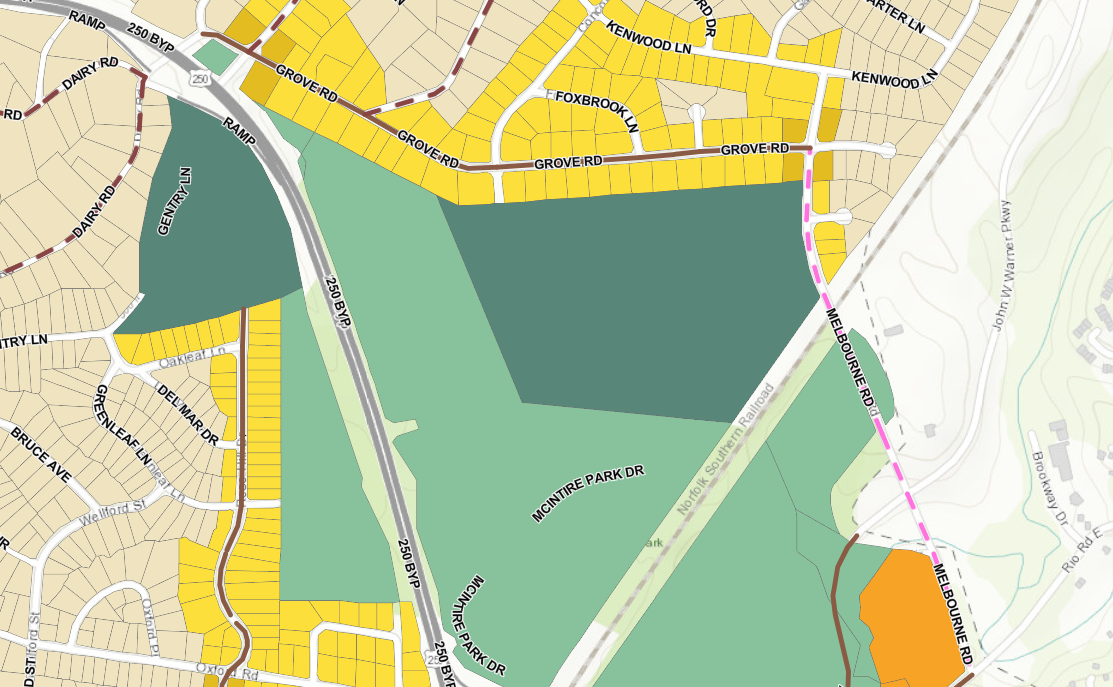Voting in this year’s Democratic primary has already begun, but the five candidates seeking three nominations for Charlottesville City Council will continue to answer questions at forums between now and primary day, June 20.
That was the case at a May 17 forum put on by the Greenbrier Neighborhood Association, which featured many questions about the proposed zoning code that’s intended to increase residential density across the city.
“What do you think about large apartment buildings near Charlottesville High School and Greenbrier Elementary School?” asked moderator Ned Michie.
For instance, Grove Road is north of CHS and is currently slated to be zoned Residential-B, which would allow 12 units on each lot, provided they were guaranteed as affordable units. The intersection of Grove and Melbourne Road would be R-C, allowing up to 16 units if all are affordable.
Among the five candidates, former City Councilor Bob Fenwick seems to be the biggest critic of the new zoning plan.
“For the last 10 years I’ve been in public life, the development community has gotten just about everything they wanted,” Fenwick said.
He added that Greenbrier works well as is, and residents should be able to decide for themselves what’s on their land without having new rules imposed by the city.
Newcomer Natalie Oschrin said the R-B zones would mean additional density, but that fears are overblown.
“That doesn’t mean that skyscraper apartments are going to be immediately popped up,” Oschrin said. “That type of apartment complex is not actually allowed. These are sixplexes.”
Oschrin said she felt developers of subsidized housing would opt to build in other neighborhoods with fewer topographical challenges.
Incumbent Michael Payne was under the impression that the additional density in the zoning code for affordability was no longer being considered. As such, he said the R-B and R-C lots would only produce between six and eight units per lot.
“I primarily just see houses that will be of the scale and height size of existing homes, but would have more affordable duplexes and triplexes in them,” Payne said. “I don’t think that’s a negative thing, and I think it does avoid these issues of a towering apartment complex next to a smaller single-family home.”
Incumbent Lloyd Snook said even if the “double density” bonus moves forward, there will be very few such projects across the city because they will be built by nonprofit groups that are able to get tax credits and other subsidies.
“There are a lot of scary thoughts going on out there that simply aren’t going to come to pass,” Snook said.
Newcomer Dashad Cooper said he supports the zoning rewrite because he has been unable to find an affordable place to live, but he does want the city to take a cautious approach.
“I have some concerns that I want to make sure we’re taking our time when they start building,” Cooper said. “It is always going to be a risk that we go into, so we just have to make sure that we are keeping the community involved and listening to them.”
The future zoning is not set in stone and a full draft is expected to be ready for review by the end of July, followed by public hearings in late summer and early fall, barring any delay.
The June 20 Democratic primary will certainly not be delayed.
Editor’s note: This story has had an instance of “Greenbrier” corrected to “Grove.” C-VILLE regrets the error.
